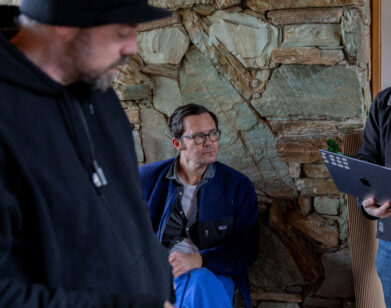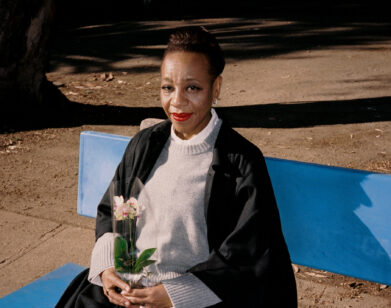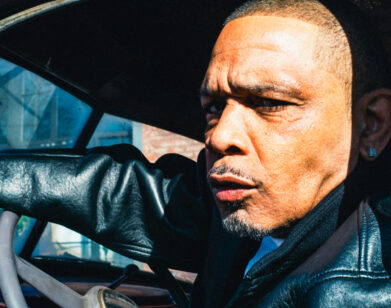In Conversation
John Carpenter and David Gordon Green Discuss Making Murder Music
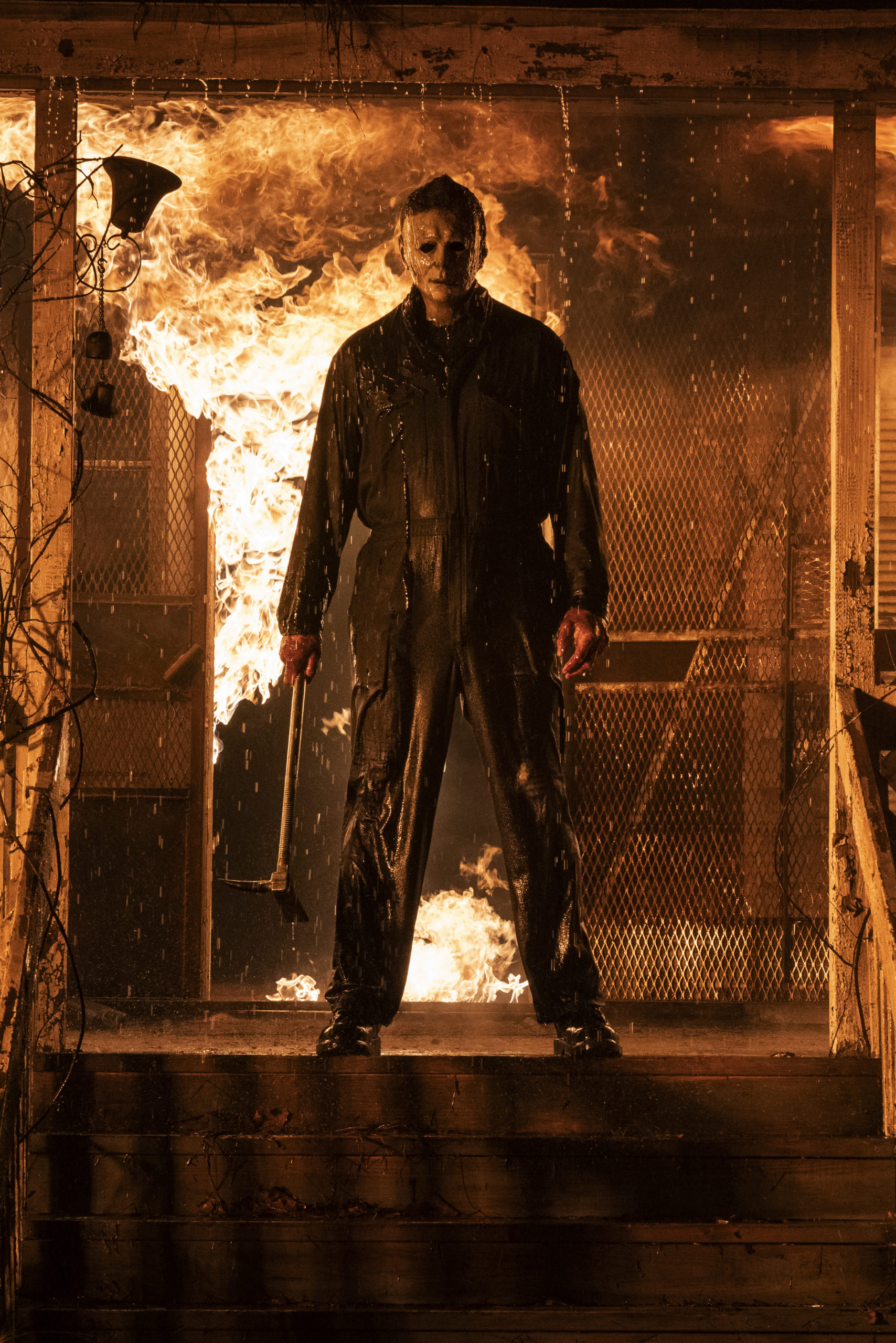
Michael Myers (aka The Shape) in Halloween Kills, directed by David Gordon Green.
Michael Myers would be any other masked psycho without the killer piano-and-synth theme that has accompanied all of his mass murdering since his first appearance in the original Halloween. Back in 1978, director John Carpenter composed the score himself, not out of a need for total creative control, but as a cost-cutting tactic for what was a very low-budget slasher flick. The score, particularly “Halloween Theme,” became as identifiable as the white William Shatner mask, and Carpenter went on to score most of his own movies with synth-heavy soundtracks. In the meantime, the Halloween franchise was handed off to several different filmmakers, each of whom used a version of the score without Carpenter’s involvement. But when David Gordon Green was tapped to co-write and direct a new Halloween trilogy, Carpenter, along with his son Cody and his godson Dave Davies, were brought on to update the soundtrack. The three of them, who had collaborated on the instrumental album Lost Themes and Lost Themes II, delivered a more produced and more severe sounds, as relentless as Myers himself. Before the trilogy’s second installment, Halloween Kills, hits theaters and Peacock this Friday, David Gordon Green hopped on the phone with Carpenter to talk about making music to get murdered to.
———
DAVID GORDON GREEN: How you doing, John?
JOHN CARPENTER: I’m good, man. How are you?
GREEN: I’m hanging in there.
CARPENTER: Where are you right now?
GREEN: I’m home in Charleston, South Carolina.
CARPENTER: What’s the story there? Is it COVID time?
GREEN: It’s been a pretty nice place to be over the last year and a half, all things considered. Not overly dramatic, but enough of a reality for slow people down a little bit, and be a little more cautious in life, which is nothing I can complain about.
CARPENTER: That’s very cool, coming from the star of the Venice Film Festival.
GREEN: We had a good time down there. It was fun to get a little change of scenery, seeing how another side of the world works. And to unleash the movie with an audience of fans and appreciative folks was elegant and unexpected.
CARPENTER: So what are we supposed to talk about here?
GREEN: I have a number of questions I’ve scribbled down and anything you don’t want to answer, say, “Next question.”
CARPENTER: That sounds good.
GREEN: John Carpenter, what has it been like returning to the Halloween franchise as a composer?
CARPENTER: Oh, wow. I’ve had a great time, and I’ve had a great director to work with, who guides me towards what we need for the movie. But the movie is so fun and good. And my son, Cody, and Daniel Davies, my godson, and I compose this music. And we’re just having a blast.
GREEN: I love that. Obviously, the Halloween theme itself is so recognizable. How do you build off that for the sequels while keeping the bones of the theme?
CARPENTER: We try different sounds and different approaches, but the basics stay the same. It’s still the same old theme; as a matter of fact, we took all the themes from the original film and refurbished them and brought them up to date and rethought some of them. And it seems to work pretty well. That’s not an answer.
GREEN: No, I love it.
CARPENTER: That’s bullshit. I don’t know. We just come up with new ideas.
GREEN: What is your process in scoring films? Do your ideas start when you’re reading the script or when you’re seeing cuts of the movie?
CARPENTER: We have the movie after your cut which is really close to the final cut. We put it up on the screen, and then we start playing music, right from the logo. And it seems to work pretty well. We build on what we’ve just done.This is all improvisational. There’s nothing planned, except maybe some of the sounds, but that’s the joy of this: letting it come out.
GREEN: Are there any horror soundtrack tropes that you try to avoid?
CARPENTER: It’s hard to avoid them completely, but we can activate so many sounds now on the computer. It’s really incredible. But now we’re getting into orchestral sounds. Hans Zimmer has a program. The BBC orchestra has a program. So you can get a flute, or a violin, or a bass violin, and a lot of synth sounds, of course. And we just find the best of the things that we like. So it’s a process of discovery as well as playing along with the movie.
GREEN: You kind of just touched on that, but can you talk about how the advances in technology have changed the way that you work?
CARPENTER: Back when I scored the first Halloween, I had three days, a piano, and a tube synthesizer program by the synth teacher at USC.And he had to tune these babies up before you could play him. Some of the stuff that I was playing was like a semitone off. It was horrible, but we got through it. And in three days, I didn’t have a way of looking at the movie; I just had to make five or six themes that I could cut in anywhere I needed them. But nowadays, not only can we watch the movie as we score, but we can call up sounds. And we just didn’t have any clue that would exist. Plus, we can make our own sounds. We can take guitars and distort them and take normal sounds, like sound effects, and work with them. It’s really a whole new world, and I love it.
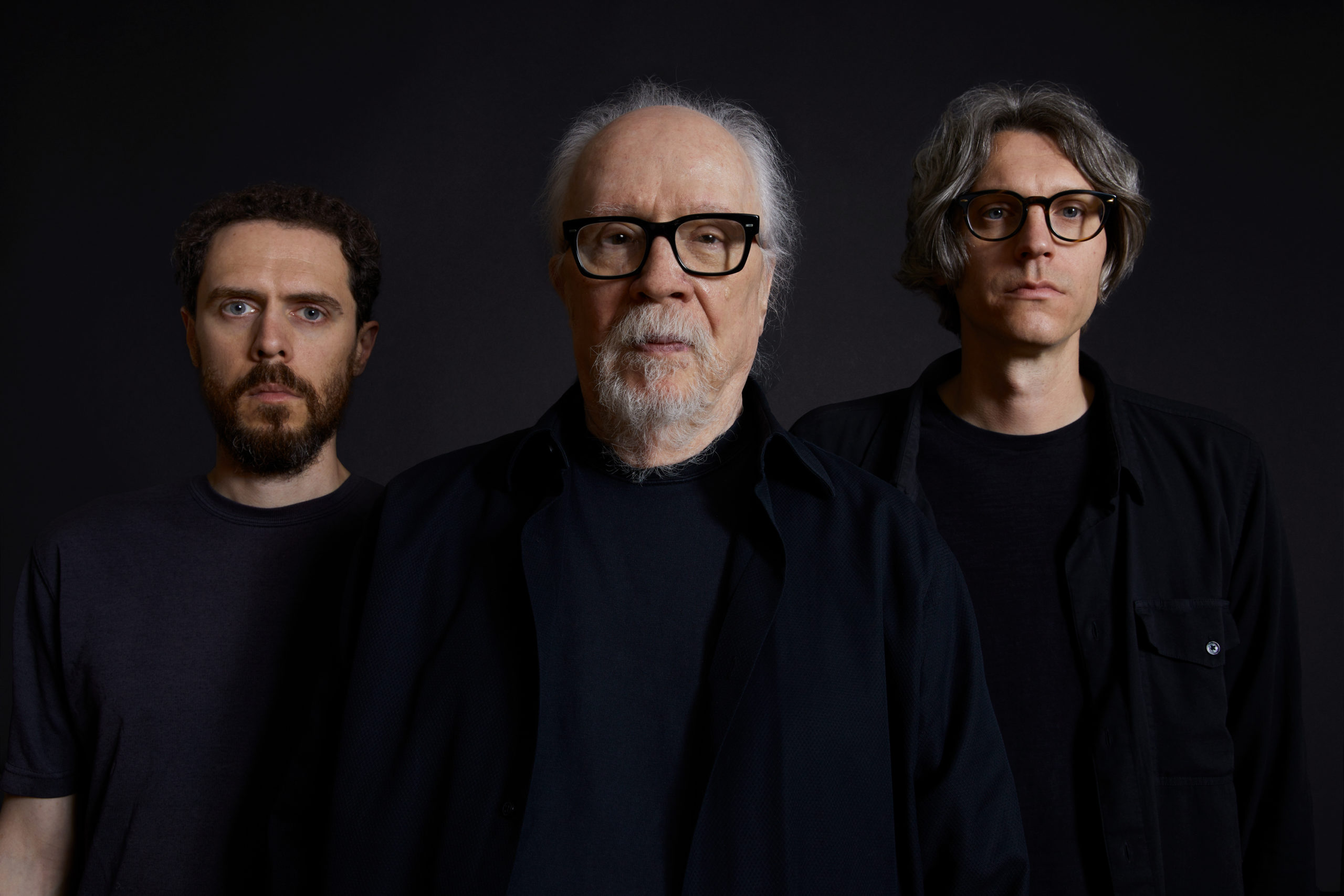
Cody Carpenter, John Carpenter, and Daniel Davies. Photo by Sophie Gransard.
GREEN: I’d mentioned to you one time that I was introduced to your films by my neighbors that went to high school with you. They were in a music program with you in high school, and they told me that you started composing scores for your films as a cost-cutting measure. Is that true?
CARPENTER: Yes. As a student, you don’t have any money. They give you some film to shoot with, and you have to make a movie. Most student films are horrible, mine included. But eventually, we started putting music in them. And there I was, trying to do my own music. That’s where it started. It was in self-defense at first, and then it became a creative voice in the movie after a while.
GREEN: That’s great. But you did some of the scores for your films, and other times, you didn’t. How did you decide? Was there an inspiration, or just whether you were appropriate for the content or not?
CARPENTER: Well, on The Thing, they didn’t even want me. This was early on in my career, so I hadn’t really proven myself. We got Ennio Morricone, who was one of the giants of scoring, so I had no problem with that whatsoever. And then later, I didn’t want to do the score to Starman, so we Jack Nitzsche, who’s again, one of the giants. But the decision was: Can I do everything that’s required in directing and finishing the movie and then a score at the same time? Which has gotten harder and harder, the older I got. It’s tough directing, David. Are you aware of this?
GREEN: It’s a pain in the butt, isn’t it? Is there any genre of music that influenced you going into the horror genre, or maybe songs that stood out for you as classics or inspiration for your passion for horror?
CARPENTER: Well, the classic horror movies and their scores have always impressed me. But the one film that set my career in motion, I saw when I was eight years old. It was Forbidden Planet.
GREEN: Nice.
CARPENTER: Forbidden Planet is a color, widescreen, space epic, and it had an all-electronic score by Louis and Bebe Barron, and my mind was blown as an eight-year-old. I couldn’t believe what I was hearing. There weren’t even synthesizers back then. There weren’t even computers back then. They used all sorts of bizarre ways of creating the sound. And the score is transcendent.
GREEN: That sounds awesome. What advice would you give someone wanting to get into a similar artistic path that you’ve taken?
CARPENTER: It depends on what that path is, I guess, but I would give them the same advice. you have to have a passion for it, and you have to want to create things. It has to be a drive inside of you. How would you answer that?
GREEN: I’d say the same thing. I think if you wake up with that energy of Christmas morning and looking to open up those presents of ideas that you’ve got percolating, or create something, or collaborate, or spitball ideas, all of those things. That’s literally better than a cup of coffee for me.
CARPENTER: Wow. Now that’s saying something right there. John Carpenter: David, I have a question for you. The last time we were on a Skype call together about the movie, your son appeared up there and said that you wouldn’t let him see Halloween Kills. Have you let him see it yet?
GREEN: He’s 10 years old. He can’t see it until he’s at least 30.
CARPENTER: That’s smart, because it’s not for wimps, my friend. It’s not for wimps.


